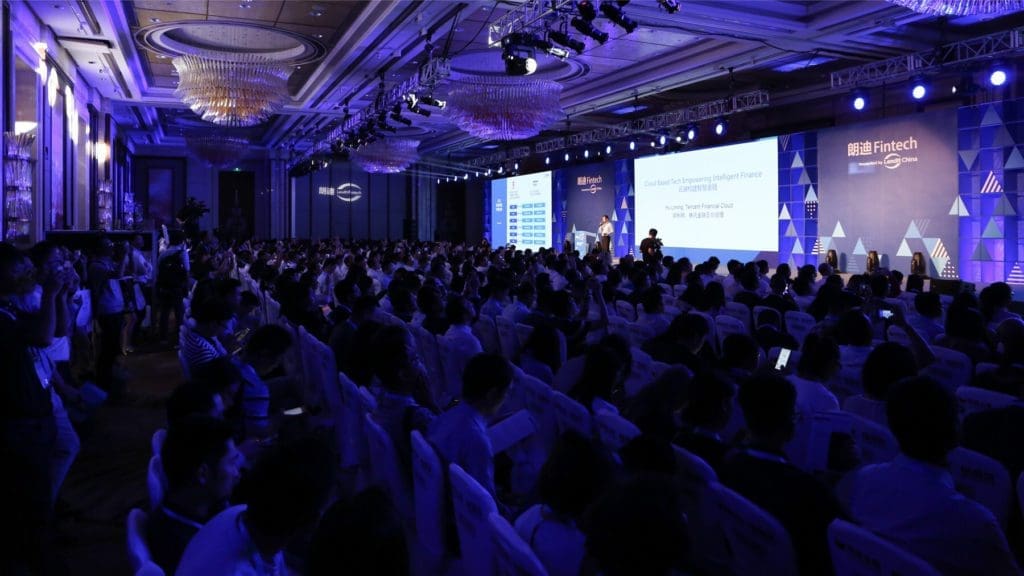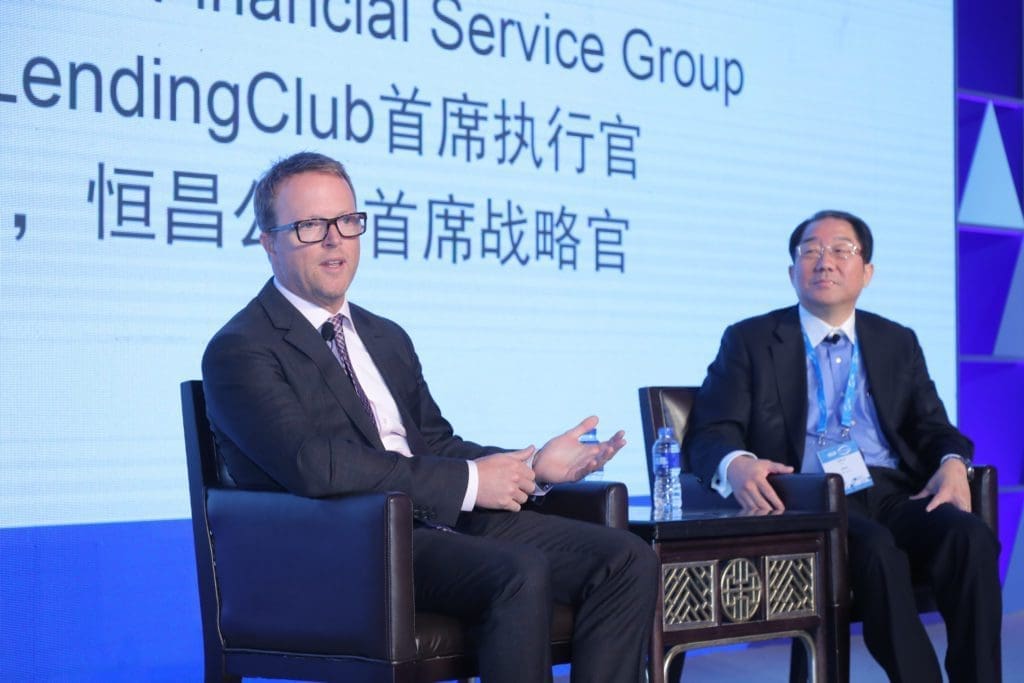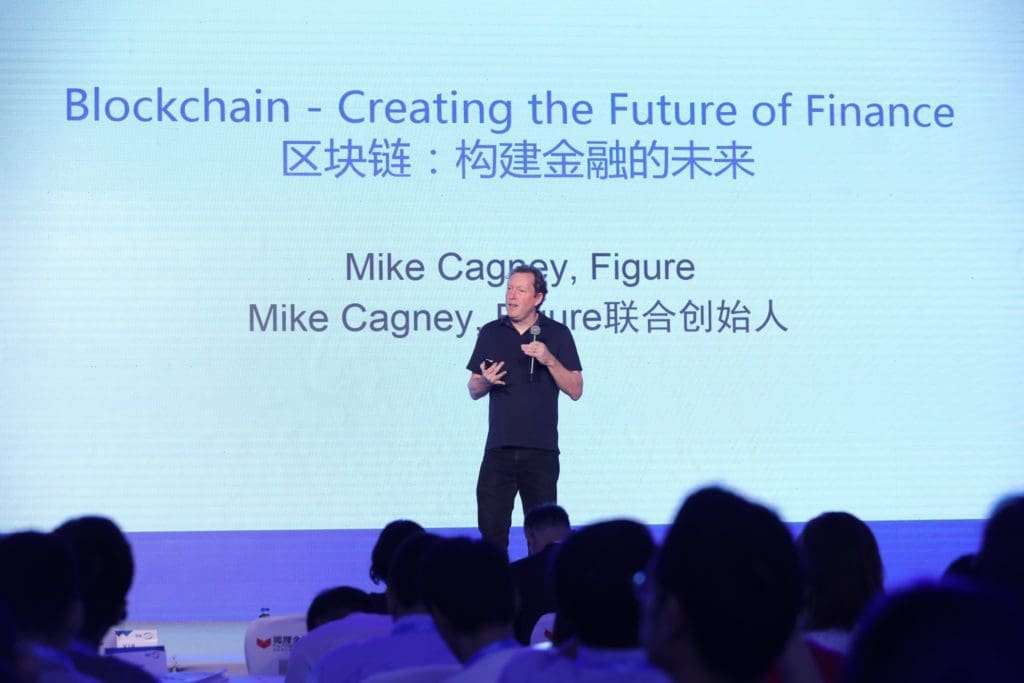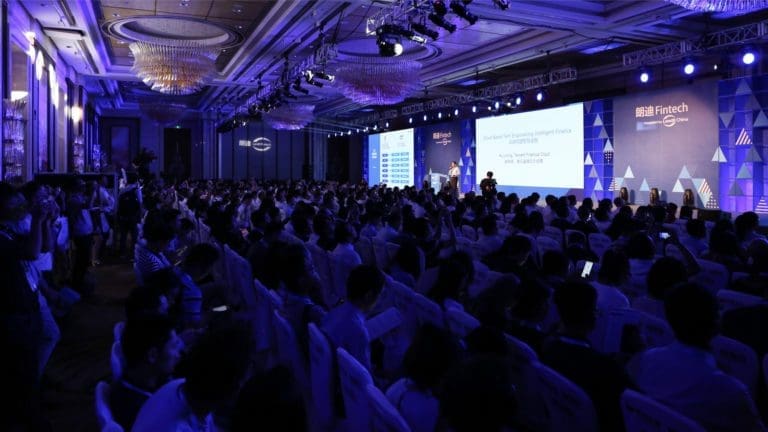
Last week I was in Shanghai for our third annual LendIt Fintech China event. This was actually my ninth trip to China since 2014 and each time I have come away so impressed with the Chinese fintech industry. At LendIt Fintech China I was reminded once again that China leads the world in many areas of fintech with their level of sophistication, innovative technology and enthusiasm for the space.
AI took center stage this year as we dubbed our event “An AI Era”. But there was almost as much talk about blockchain and the impact it will have on the future of financial services. Another theme that emerged from the event was the importance of inclusive finance and bringing more people into the modern financial system. I should also point out the elephant in the room was the challenges of the p2p lending industry in China right now and it was interesting to me that several speakers dealt with this issue head on.
Highlights From the Keynote Stage
I actually kicked the conference off with a presentation centered around fintech and banking. I maintained that the future of fintech will be inextricably linked with the future of banking. The largest banks dwarf the largest fintech platforms when it comes to total assets or lending and this year we have seen more banks launch their own digital platforms than ever before. That trend will continue I expect.
Hu Liming from Tencent Financial Cloud talked about the importance of the AI offerings within their cloud computing platform. AI is powering their anti-fraud offerings, their lending process, their collections and customer service efforts. More than 20 of the largest banks and insurance companies in China are using Tencent Financial Cloud for their core services.
Xiao Wenjie of LexinFintech (publicly traded on Nasdaq: LX) gave some fascinating insight into the way they are using AI to detect fraud. He talked about the importance of location data and the fact that bad actors often congregate in the same area, sometimes even in the same building. Lexin incorporates mobile data, courier delivery information and social network activity, a total of more than 7,000 data points, to assess whether a transaction may be fraudulent.

Scott Sanborn, the CEO of LendingClub, on his first trip to China said he was blown away by the scale in China and that how exciting it was to be in a country with no real legacy financial infrastructure. He loved the advances that China has made with credit on demand and how one day it may replace the plastic-based infrastructure in the US. When the talk moved to regulation he had this to say: clear regulations, clearly communicated are good for the system and good for the consumer. He closed by saying that LendingClub has no plans to expand their operations to China.
Yihan Fang, the CEO of Yirendai (NYSE: YRD) talked about inclusive finance and how in China there is still huge demand for online loans. She mentioned the new Inclusive Finance Index for China which is adapted from the work done by the World Bank. She defended p2p lending as a great business model when done the right way and stressed the unmet financial needs of consumers across China. Fintech companies are best positioned to satisfy these needs.
Jesse McWaters, the financial innovation lead at the World Economic Forum, gave an excellent presentation on blockchain. He explained why we are not yet seeing broad adoption of blockchain in finance yet: existing infrastructure is doing a good enough job and replacement of this infrastructure is difficult. The biggest opportunities are where there are new frontiers, new areas where there is no existing infrastructure like art, diamonds and collectibles. He pointed out that collaborative communities are as critical as technology to the success of any blockchain project. While blockchain development is not going to be easy he ended by saying this: stop imagining new ways the world could work at your own peril.
Alex Ho from Fox Fintech Group talked about SME lending in China. SME businesses in China account for 80% of employment and 60% of GDP. While there are only officially 2.6 million small businesses there are 60 million sole proprietors. Only 17% of SMEs can obtain loans from a traditional financial institution leaving a huge gap in the market that is being filled by fintech platforms. In the last three years there has been an explosion in data sources that help underwrite SME loans more accurately.
Jayne Opperman is the Head of Consumer Technology for APAC/EMEA at Citi. She is based in Singapore and she talked about her experiences in China from the perspective of a large global bank. One thing I didn’t know is that Citi has had operations in China since 1902, longer than just about any other foreign bank, so they have a deep understanding of the country. She talked about the importance of agile decision making, not just in technology, but in all areas of the bank. She also said that coming to China is almost like going in a time machine, you are seeing the future of finance today.
Zhou Hanmin of the Chinese People’s Political Consultative Conference talked about the importance of AI to China’s economy. He said to maintain China’s growth, it was critical to increase productivity and AI is one of the keys to doing that. China was playing catchup in AI but now they are leading the race. He gave the example of iPhone manufacturing. Initially, the default rate for new iPhones was 1% but today, after implementing AI in the manufacturing process, the default rate is now 0.01%.
Professor Bei Duoguang from Renmin University of China talked about inclusive finance and how the gap between the rich and poor in China is increasing. He said that 400 million people in China don’t have access to a bathroom in their home. He also said one of the keys to expanding consumption is a robust consumer finance ecosystem offering a diversity of products.

The highlight of the entire conference for me was Mike Cagney’s presentation. The CEO and co-founder of Figure (formerly CEO of SoFi) has developed blockchain technology called Provenance that could well rewrite the future of finance. It is an entirely digital loan origination, servicing, and trading system where the loan assets reside on the blockchain. The cost advantage is a reduction from 100 bps down to 35 bps for each loan. Mike introduced us to what he calls digital equity, the token stock they will be introducing. They have developed the home equity line of credit product at Figure primarily as a use case for their blockchain technology and they expect to do their first securitization with this system by the end of the year.
Chris Skinner of The Finanser has been coming to China for 20 years and he talked about the changes he has seen in this time. He said it was techfin, not fintech, that is most transformational. This is where technology companies tackle finance in new ways where code is the real future of finance. He gave the example of Alibaba where each employee generates $16 million of revenue for the company versus Barclays in the UK that generates $400,000. What is unique about Alibaba is that they recreate their code base from scratch every three years so they can never be stuck with legacy technology. They are currently working on their fifth generation systems architecture that will allow them to process 1 million transactions a second. By comparison, Visa is can process 2,000 transactions a second. He left us with the thought that maybe QR codes, which are everywhere in China, will be the global payment method of choice in the future.
There were some other keynotes that I unfortunately missed and there were dozens of sessions in tracks and workshops but that will give you some flavor of our two days in Shanghai. A lot of discussion of fresh ideas and networking with new connections being made.
Walking around the streets of Shanghai I saw firsthand what it is like to have built a consumer finance system based on the smartphone. No one carries cash or even credit cards because everything revolves around the phone. The rest of the world will catch up eventually, but it might take several years. In the meantime China will continue to move forward and establish themselves as the hub of innovation in finance.


